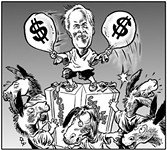Capitol Chronicle
It's Beginning to Look a Lot Like Vouchers: is the lege preparing a bad idea whose time has come?
By Michael King, Fri., Dec. 20, 2002
It didn't help the voucher cause that several state-funded charter schools -- halfway houses between traditional public schools and unregulated private schools -- made headlines for both low student achievement and disastrous financial mismanagement. If the authorities couldn't keep tabs on the charter schools that they're supporting directly, how would they monitor a myriad of unregulated strip-mall schoolrooms that would hang out a "Phonics 'R' Us" shingle in search of public education dollars?
Then came Nov. 5.
In the wake of the Republican victory, GOP legislators are once again raising the possibility of addressing a voucher bill this session. Speaker-to-be Tom Craddick, making the rounds of newspaper editorial boards, allowed that perhaps the education solution most beloved of right-wing policy foundations would indeed receive another go-round in the 78th Legislature. "We will probably see a run at a pilot program," Craddick told the San Antonio Express-News. "I'm for trying anything in education that might work." Anything, that is, except adequately funding the schools we already have.
Rep. Paul Sadler, D-Henderson, who is retiring from the House, co-chaired the Interim Joint Select Committee on Public School Finance. He recently told the Longview News-Journal that the refusal of the Republicans to seriously address the need for more education revenue also points in the direction of vouchers. "You're going to see a voucher program," he said. "There's too much [campaign] money that's been put into the Republican Party."
Show Us the Money
Lacking a funding magic wand, Sadler's school finance committee was unable to agree on a single recommendation to reform the system. Legislators and witnesses all duly professed their dislike for the decade-old "Robin Hood" recapture system that has imposed a provisional equity on Texas schools. Yet Sadler pointed out, "I've yet to see a single, solitary soul walk into the Capitol and say, 'This is a better way to do it.'" Outgoing Lt. Gov. and state Sen. Bill Ratliff, R-Mt. Pleasant, no rookie at this chore, told the committee that without additional revenue, rearranging the financing system to relieve increasing pressure on "property-rich" districts would be a temporary exercise at best. He gave it a valiant shot anyway -- to no visible consensus.
What does all this have to do with vouchers? Plenty. There are approximately 4.3 million children of school age in Texas. Approximately 93% of them are currently being educated in public schools, meaning roughly 295,000 attend private schools, mostly church-based schools of one form or another. Suppose the Legislature were to decide, this spring, to grant a "voucher" worth $4,000 or so ($1,000 less than the current per-student allotment for public schools) to each of those private-school students to defray all or part of their tuition. Conservatively, that's a cool $1 billion deducted from the very same public school budget -- without moving a single student out of a supposedly "failing" public school.
A Shell Game
That won't happen, of course. Need we recall, the state budget is $5 billion in the hole and sinking? Even should enough legislators wish to enact such a program, the budget constraints are overwhelming, and the political firestorm would be worse. Likelier is some variation on the "pilot" program first proposed in 1999, offering roughly 150,000 students in "low-performing" schools in a half-dozen urban school districts the possibility of getting a voucher to help pay the cost of a private-school education. On Tuesday, Houston Democrat Rep. Ron Wilson re-filed his pilot voucher bill, HB 93. Not many students will be able to take advantage of such a program, and those who do will be severely constrained in their "choice" of schools available for the price of a public-school voucher.
But some students will indeed move to private schools, from public schools made that much poorer by the voucher deductions from their budgets. A few thousand more students will attend private schools, mostly religious schools abruptly underwritten by all taxpayers. The dollars lost directly through vouchers will not be formidable for the first several years. And it will take a few more years before parents of all private-school students point out (politely, of course) that they, too, deserve the tax refund -- excuse me, voucher -- as their equitable reward for making the private decision to send their children to private schools.
Are we forgetting anything?
Ah, yes -- the remaining 4 million or so students (increasing annually by 75,000) who will continue to attend public schools into the foreseeable future. Their educational needs will continue to be evaded by politicians intent on solving the problem of public school finance by ignoring it until they are forced to do otherwise. Meanwhile, the Fort Worth school district is considering "saving" $7 million by increasing teachers' class loads and cutting back on prep time, and the Houston ISD is trying to find another $154 million in budget cuts. Here in Austin -- a "property-rich" district -- administrators are trying to pay for more phys. ed. classes (mandated but not funded by the Legislature) by canceling fine arts and music.
School vouchers are and always will be a sideshow, a political shell-game designed to pacify a vocal and wealthy minority at the expense of the overwhelming majority of the state's children and families.
Once again: The needs of the state's public schools cannot be addressed until the state of Texas has a tax system that is both adequate and fair. The current crop of politicians has achieved office by insisting that the only problem with taxes is that they are too high. They neglect to add why local property taxes are too high: because the state government has neglected its constitutional responsibility to adequately plan and provide an efficient and equitable system of public education, among other attributes of "the general welfare."
For 2003, all the early signs suggest more of the same. ![]()
Got something to say on the subject? Send a letter to the editor.








